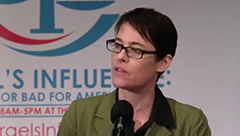“Valentino’s Ghost: Why We Hate Arabs”
By Catherine Jordan
 Delinda
Hanley: So we’ve had TV media, and talked about the mainstream
press. Now we’re going to talk about Israel’s influence on the film
industry. Catherine Jordan is the award-winning producer and
co-editor of “Valentino’s Ghost: Why We Hate Arabs.” A journalist
for 14 years, Catherine spent five years working with director
Michael Singh to shape this film first released—and, I believe,
suppressed—in 2013. Viewers from 127 countries watched “Valentino’s
Ghost” when it was featured on Al Jazeera English in 2015.
“Valentino’s Ghost” has just been re-released, and copies are
available from Middle East Books and More booth, and on our website.
It now includes the Israeli bombing of Gaza, the Charlie Hebdo
murders, the Hollywood film “American Sniper,” and Donald Trump’s
anti-Muslim crusade.
Delinda
Hanley: So we’ve had TV media, and talked about the mainstream
press. Now we’re going to talk about Israel’s influence on the film
industry. Catherine Jordan is the award-winning producer and
co-editor of “Valentino’s Ghost: Why We Hate Arabs.” A journalist
for 14 years, Catherine spent five years working with director
Michael Singh to shape this film first released—and, I believe,
suppressed—in 2013. Viewers from 127 countries watched “Valentino’s
Ghost” when it was featured on Al Jazeera English in 2015.
“Valentino’s Ghost” has just been re-released, and copies are
available from Middle East Books and More booth, and on our website.
It now includes the Israeli bombing of Gaza, the Charlie Hebdo
murders, the Hollywood film “American Sniper,” and Donald Trump’s
anti-Muslim crusade.
Catherine was an editor and staff writer for the Los Angeles
Times and a correspondent for The Daily Telegraph in
London, The Hollywood Reporter, Los Angeles Magazine,
the Tatler, The New Scotsman. She has spent three
years as a writer at Hollywood’s Paramount Studios researching
Paramount’s theatrical library of 2,500 films. Jordan was honored at
the Muslim Public Affairs Council’s 2014 Media Awards as a “Voice of
Courage & Conscience” for her role in producing “Valentino’s Ghost.”
Please welcome this gifted film producer.
Catherine Jordan: I’m the final act. I’m just going to talk for four
minutes and then show you some of our film. The director of the
film, Michael Singh, is in Egypt today, where he showed the full
film last night in Tahrir Square in Cairo. He e-mailed me to tell me
that the sound was out of sync with the picture by three or four
seconds. Despite this disastrous blunder, it was met with enormous
enthusiasm by the crowd. So this is good.
Most Americans have been hearing from the media all their lives that
the Middle East is somehow inherently in a permanent and
inexplicable state of crisis. By media, I mean traditional
television news, newspapers, magazines and, no less importantly, the
narratives that we see in movies, even in children’s cartoons. Like
most people in this country, I never understood why they couldn’t
all just get along. Until I got involved with this film, in fact, I
always came away from the media coverage of the Middle East with the
conclusion that it was just somehow far too complicated to
understand, and that it was all over my head. The media seemed to
convey a worldview that Palestinians and other Arabs were just
somehow inherently violent and irrational people doing hijackings
throughout the 1970s and endless suicide bombings for seemingly no
reason.
After 9/11 I think a lot of people in our country found themselves
asking huge questions. Who are these people? Why are they so angry?
How is it that I know so little about this subject? Our film, I’m
very pleased to say, after this amazing day, enshrines much of what
has been said today by all the incredible speakers. We seek to
expose and explain the reasons behind our longstanding hatred and
fear of Arabs, Muslims and Islam in this country. We also seek to
show that U.S. foreign policy in the Middle East, and especially
that of Israel, is what really dictates public perceptions and
attitudes toward the Middle East in this country, and has done so
for more than a century.
It should astonish and appall the public that the mainstream media
typically goes right along with the government’s narrative, and
then, in turn, the government brandishes those media reports and
says, see, here’s the evidence right here on the front page of
The New York Times. The yellowcake [uranium] debacle in Iraq
was a flagrant example of this, but certainly not the only one.
So the government then recycles those stories to further reinforce
their own narrative in support of policy decisions and military
invasions and so on. So there’s a vicious circle here. The
stereotypes of Arabs and Muslims inform the behavior of
policymakers, who then create policies which unashamedly place an
extremely low value on the lives of Palestinians and others in the
Arab world, and then the policies in turn reinforce the news and the
entertainment industry, and so on. So what you get is this
self-reinforcing cycle, this infinite[infinity?] loop if you will,
and with very destructive results.
This cycle shows the enormous power of the mass media to shape the
public’s ideas and mold our opinions for us. So I feel it’s really
valuable for us to be able to tell this story in the medium of film,
which, of course, we believe can have a very powerful impact, and a
medium which has a lasting impact and can now be widely shared in
the digital era by huge numbers of people.
Two months ago, our film was broadcast worldwide on the Al Jazeera
English network. As I’m sure you all know, the network is an
English-language TV news network carried in more than a hundred
countries around the world. So the film ran in Great Britain. It ran
throughout Asia. It ran throughout Europe. It ran to a potential
subscriber base of 130 million households, which sounds like a
fantastic success.
However, there was one country that wasn’t on the list—the United
States. You knew that was coming. The film did not play in the
United States, and it has not played in its full feature length in
the United States.
Again, we were thrilled when our film premiered at the Venice Film
Festival which—along with the Cannes Festival—is the most difficult
festival to get into in the world of filmmaking. It's almost unheard
of, in fact, that the Venice Festival accepts a documentary film.
The film was welcomed in 12 other festivals in Europe and Asia. But
every major festival in the United States has turned us down. A top
tier festival for a filmmaker is a launching pad. It's a
marketplace. It's where you get attention and it's where you sell
your film to a distributor. Often right there at the festival itself
is where the meetings take place and the deal is made. So it's key
to the success of your film.
After our success in Venice, where the film got a standing ovation
and a lot of good press buzz, our phone started ringing, with all
the major U.S. festivals saying they'd heard great things about the
film. Some of them had seen it at Venice and they’d like to show it,
so could they view a DVD for consideration for their festival? Even
Michael Moore called us to get it into his annual festival. So we
submitted DVDs of the film to the selection committees of all these
top notch festivals at their behest. And then we never heard from
any of them again across the board. There was a virtual blackout.
You are all familiar with this. Was it just not good enough? You
have to face that as a filmmaker.
It wasn't just not good enough. We looked at that.
With that said and with all due humility, our film received a
standing ovation at Venice. It received a glowing review in The New
York Times and in the Los Angeles Times and in the Village Voice.
The New York Times designated it a favorite critic's pick,
which is a real honor. The magazine The American Conservative
published a brilliant feature saying that our film essentially got
it right.
Yet, we had a blackout from U.S. festivals and distributors. So
ironically, the very forces which we are trying to expose and
discuss in the film are the very forces that are essentially
virtually suppressing wide distribution of our film in our own
country. Maybe we should have thought of that after spending years
and years and years making this film, but we persevered. Perhaps if
the wider public is actually informed and educated on this issue and
learns the answers to so many questions, maybe we can begin to take
the steps toward a future not of violence, but of peace.
I'd like to show you a few clips from the film right now. And just
by way of explanation, it's not a tightly edited trailer that you're
typically used to seeing. It's just a series of short clips or
excerpts plucked from throughout the whole duration of the film.
Thank you.




